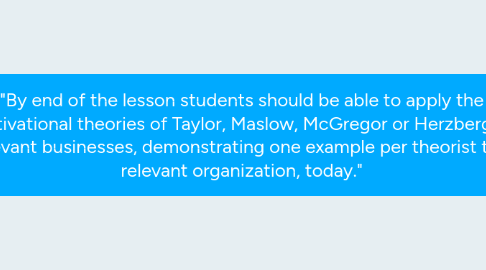
1. Zoe
1.1. Readiness
1.1.1. Zoe is one of the better performing members of the class. ELL: Advanced fluency stage
1.2. Interests
1.2.1. Zoe is very much into art and likes t design and sell jewelry in her spare time
1.2.1.1. Teaching Strategy #1 To accommodate the visual learner(s) in the class, the four main motivational theories (in diagrammatic representation) will be sent to the students tablets/smartphone devices before the start of the lesson.
1.2.1.2. Teaching Strategy #2 I will utilize innovative 21st Century Technology by using an app which allows students to present their findings in a Venn Diagram on their Tablets. Students (like Zoe) will have the option of skipping the Venn Diagram and designing their own graphical representation of the data in Instaviz or Omnigraph. This information will then be shared with the group for further discussion on the groups WeChat page, which can be accessed on their smartphone/tablets.
1.2.1.3. Teaching Strategy #6 To further challenge Zoe and other Advanced fluency stage students in the class I will ask them a follow up questions which will challenge their assumptions, for example, 'Organisations like banks should not be allowed to motivate their staff by using large financial rewards [as this policy brought the world economy to its knees in 2008]' and have them discuss whether they agree with this statement.
1.3. Learning Profile
1.3.1. Zoe is a visual learner
2. Henry
2.1. Readines
2.1.1. Henry's English is a particular barrier ELLs: 1 Speech Emergent Stage
2.2. Interests
2.2.1. Likes sport and in more specifically wants to study sport management
2.2.1.1. Teaching Strategy #3 Henry as well as any other students who share similar interests will be encouraged to apply the motivational theories to different sports and echelons and organisational structures of sport and their business organizations and or governing bodies. Students will be encouraged to use the internet to help in their research.
2.2.1.2. Teaching Strategy #4 At the start of the lesson Teacher will read information from the textbook out loud so everyone has access to the information. Teacher’s verbal instructions will be concise (under a minute) when describing each activity.
2.2.1.3. Teaching Strategy #5 Since Henry is at the ELLs Speech Emergent stage it is important to provide him with alternative ways of accessing key content (since the object of the lesson is primarily business and the understanding of motivational theory, the option for him to use the internet in class to conduct research means that he can access information in his first language, Mandarin) This allows the student to continue to learn the same material as other students, so he can stay abreast and up to speed.
2.3. Learning profile
2.3.1. Henry is an audio learner

